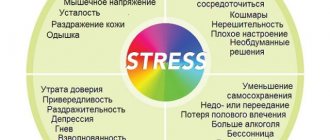Pessimists and optimists - what's the difference?
In life, you often have to decide what is more important: health or money, love or freedom. Some cannot refuse any of the opportunities, and as a result are not happy about having all the others, which makes them deeply unhappy. After all, you want to have everything at once!
And some people are completely deprived of the opportunity to choose. God (life circumstances, fate, other people) have already made a choice instead of them. The inaccessibility of pleasures and any blessings in life makes them dissatisfied with their lives and gives rise to envy of those who have it all.
And there are those who simply have nothing to choose from. They are deprived of all the joys of life, they wander through it sadly, they are haunted by failures and they look sadly, with envy, and sometimes with anger, at the “lucky ones” from the first two categories.
There is an expression: if God wants to punish a person, he deprives him of his mind. If we translate it into modern language, it might sound like this: if life wants to punish a person, it deprives him of optimism. The pessimist takes everything else from himself. And in this case there is no question of any harmony. The pessimist refuses it, from happiness, he revels in his misfortune.
At first, the pessimist gives up his desires. Not because there are no opportunities to implement them - he simply does not have faith in this possibility. He joins the ranks of people dissatisfied with life. Thus, he allows other people or life circumstances to control his life.
When a person buries his capabilities, he stops noticing them at all. He moves into the category of unfortunate people who eke out a miserable existence, are angry with the whole world and mourn their fate. There is no time for harmony with the world and people...
But in real life there is no such thing that a person cannot find a reason for joy. It's just that each of us looks at the world differently. Someone got into an accident and laments that he dented his car, while another in the same situation is glad that he is alive and did not harm anyone.
Someone ended up in the hospital and is sad that they lost a lot of time in vain, and even the scar from the operation will remain ugly, while another, in the same circumstances, thanks God and the doctors that he remained alive.
Someone’s wife left him, and he became the most unhappy person in the world and decided that life was over, and someone thanks God that He took the unfaithful man away from him in time.
That is, an optimist will always find something positive in any situation, although perhaps not immediately, but over time. Only real grief unsettles him, but even in such a situation he will recover faster.
A pessimist sees only the “dark” sides of life, and in order to bring him to a happy state, something very positive must happen. But everything in the world is relative, so an optimistic outlook on life is more suitable to real life and brings a person closer to harmony.
Although there are few absolute optimists and pessimists in life. We all often succumb to a bad mood and see the world in faded colors, and sometimes, on the contrary, everything seems bright and colorful to us, we rejoice, happiness and harmony come into life. You just need to learn how to get rid of negative thoughts in time.
Links
- Quote by: Lebedev A.V.
Logos of Heraclitus. St. Petersburg: Nauka, 2014, p. 191. - Translation by A.V. Lebedev. Quote by: Lebedev A.V.
Logos of Heraclitus. St. Petersburg: Nauka, 2014, p. 191. - As, for example, in the work “De ortu scientiarum” (2nd half of the 13th century) by Robert Kilwardby: “Harmonia autem nihil aliud est quam rerum diversarum concors
ad invicem coaptatio sive modificatio.” - Mus. ench., XIII “De proprietate symphoniarum”.
- Original: Armonia est diversarum vocum apta coadunatio.
- See, for example, “Musica enchiriadis” by Hukbald (IX century), Enchiridion Uchubaldi (X century), Marchetto Paduan Lucidarium (beginning of the 14th century), Nicholas of Capua (1415), Frankino Gafuri (“Extractus parvus musicae”, ca.1474), John Ciconia, Nikolai Burzi, Biagio Rossetti, Stefan Vanneo and others.
- Harmonia est modulatio vocis, et concordantia plurimorum sonorum, vel coaptatio. See, for example, Aurelian of Reaume (9th century), Jerome of Moravia (13th century), Walter Odington (“De speculatione musicae”, early 14th century) and many others. etc.
Why negative thoughts deprive us of peace and harmony
Thinking negatively and being unhappy (or rather, feeling unhappy) is harmful. This feeling prevents us from enjoying what we already have. It deprives us of self-confidence and takes away the will to win. We develop a “victim complex”.
A person who is confident in his bad luck misses chance after chance to improve his life. But he will definitely take the opportunity to further aggravate his misfortunes; he seems to attract them.
A “dead zone” forms around such a person, where no one wants to step. He is surrounded by a negative cloud, and it is no longer clear whether he himself attracts bad luck, or whether failures actually pursue the unfortunate person.
All his bad premonitions come true. Bad luck covers all areas of his life. Failures in the family lead to problems at work, money flies by, then health problems follow - a huge lump of failures in everything is formed.
Neuroses, chronic depression, digestive problems, cardiac disorders - this is what often accompanies an unhappy person.
But he wanted happiness in life, to live in harmony with the world and people. He wanted to be healthy, wealthy, loving and loved, but did not believe that this was possible and became sick, unhappy and lonely.
How to break this vicious circle? How to bring harmony into life? Is it possible?
Bob's Principle
Oh, this principle was created with a certain amount of irony and humor. However, it reveals human relationships in the best possible way. This principle is that, first of all, you need to monitor your behavior, only then find fault and criticize others.
If your relationships with others are not going well, do not immediately rush to blame them. Carefully analyze your behavior. In the original, this principle sounds like this: if Bob’s relationships with the people around him don’t go well, it’s Bob’s fault, not theirs.
So, in any situation, first try to find the reason within yourself.
How to bring harmony into life?
You can break the circle of bad luck and bring harmony into your life, you just need to turn on positive thinking . This term came to us from the West and means self-programming for success.
A person needs to gather his willpower and concentrate on the positive aspects of his life. For example, a problem has arisen. You need to carefully consider the option of a successful solution, consider the happy coincidence of circumstances from all sides, and imagine in pictures how it all happens.
Our brain is designed in such a way that it cannot simultaneously think about two opposing versions at once. A person determined to successfully solve a problem notices everything that can help him and strives to realize his dreams.
When a person is in a positive mood, waves of confidence and calm emanate from him. Such a person is harmonious, people are drawn to him, who know that everything will work out with him, everything will be fine.
Perhaps a person with positive thinking does not feel complete harmony and happiness (do not forget that everything in the world is relative), but he does not dwell on the bad, on the contrary, he changes this bad for the better.
Therefore, in order to have harmony in your soul and life, you need to strive to become an optimist.
Other options
These include the following.
There are a number of other meanings of the word “harmony”.
We see reality through the prism of our mind
The Buddhist monk Shantideva wrote in his philosophical treatise:
You can conquer everyone by conquering only your mind. All fears, as well as all endless suffering, originate in the mind
Shantideva
If you analyze your feelings in certain unpleasant situations, you can come to the shocking conclusion that it is not the situation itself that causes us suffering, but our attitude towards it. This is a twist, right? There is such a fairly widespread disease as cynophobia - the fear of dogs. And sometimes this fear is so irrational that a strong, healthy man can shake with fear, like a child, at the sight of a small, harmless puppy that doesn’t even really have teeth.
And, as a rule, no arguments work here - a certain negative attitude in the subconscious is triggered, generated by a traumatic situation from the distant past, and that’s all - fear covers the person. Irrational, illogical animal fear paralyzes an adult, adequate person, who in everything that does not concern his phobia is completely reasonable and sane.
So what causes suffering? Harmless puppy or inadequate reaction of the mind? The answer is obvious. But if in this situation the answer is obvious to many, then considering the cause of his suffering, for example, bad weather or a long stay in a traffic jam, is practically a rule of good manners, and if you tell such a person that he invented his suffering for himself, he will extremely indignant.
But by and large, this situation is no different from the situation with a puppy - only our attitude towards certain things makes us suffer or rejoice. For a person who does not suffer from cynophobia, a puppy will only cause a storm of positive emotions, that is, the object is the same, but the perception is different.
Most often, we cannot radically influence what happens around us. But we can change our attitude towards this.
Yes, it’s hot in the summer, cold in the winter, the boss is a tyrant, and the neighbor smokes on the balcony in the morning, interfering with doing exercises. But if there is no real opportunity to change the region of residence, work and adequate dialogue with a neighbor is impossible, all that remains is to learn to treat this with equanimity. In addition, we should remember the law of karma, according to which we cannot face a problem greater than the one we ourselves created. And awareness of this immediately allows you to moderate your indignation and gain patience.
Try applying this idea in real life. Start with something simple - if there is something that somewhat poisons your life, try to be indifferent to it. But if you manage to understand that all difficulties lead to development, perhaps you will also be able to fall in love with your problem.
Taoism includes three jewels
Lao Tzu outlines what he calls the three jewels. Three values or qualities of mind that are the key to a life of virtue, integrity and harmony.
These three jewels are compassion, moderation and humility.
“With compassion you will be brave,” Lao Tzu tells us. “With moderation, you can give to others. With humility you can live honestly.”
These are great values to live by. Compassion is seeing through the eyes of love. And we do this simply by recognizing our common connection as the embodiment of Tao.
The human ego tends to fuel judgment, competition, and negative comparison. When this happens, compassion withdraws and we become disconnected and distant from our fellow humans. This almost inevitably leads to isolation, conflict and disaster.
Taoism - natural rhythm
Taoist philosophy was inspired by careful observation of the natural world.
You only need to spend a little time outdoors to feel the eternal pulsating rhythm of nature. The sun rises and sets every day, and the seasons change one after another. Rivers flow to the sea, and clouds feed the earth with water. Trees and plants grow, bloom and decay. Animals live according to their unique nature, instinctively knowing everything they need to live and reproduce.
The entire cosmos operates according to built-in programming. The hidden intelligence that exists and operates in all things and in all beings.
This includes people. However, as the only species endowed with intelligence and the capacity for free will, humans are also the only species capable of violating their own nature.
What is Tao?
Taoism is based on the concept of Tao. Literally translated, it means "The Path".
Tao can be understood as:
“The immaterial, formless essence of all things. It is the noumenon at the root of all phenomena; the invisible cause presupposed by the visible world of the effect. Without this nothing could exist, and yet our senses perceive only external manifestations.”
So we can think of the Tao as the blank canvas on which this entire universe appears. Moreover, it is also the driving mechanism of creation, the source and essence of all things.
Tao is the natural, omnipresent and easy order of the cosmos. Creative energy that infuses and animates everything on the macrocosmic and microcosmic levels.
It is the force that directs the orbit of planets, stars and galaxies. This causes rivers to flow to the sea. And it allows our bodies to digest food, circulate oxygen, and effortlessly breathe, grow, and live.
This creative principle is invisible to the senses. But this can be clearly deduced from its effects. If this did not exist, nothing else could exist.
The universe cannot suddenly appear. In order for something to exist, there must be some factor that supports its existence. This factor is called Tao.
Taoism is largely a “cold” philosophy.
For Taoists, the secret of life is not to force, irritate or struggle to control and manipulate reality, but to relax, smile and go with the flow, allowing things to naturally unfold.
In doing so, we return to conformity with the natural order of the cosmos.
Result? Our lives unfold with much more harmony, peace, joy and ease.
One analogy for understanding the practical application of Taoism is to think of troubled waters. What's the best way to clear cloudy water? Do you stir or try to remove all the dirt particles? This actually creates more clutter. Water purifies naturally when we simply allow sediment to settle.
The ancient sages realized that the human mind works on the same principle.
Instead of trying to understand, search and control, when we allow ourselves to be peaceful and calm, we find ourselves returning to balance effortlessly.
In today's super-stressful times, could this ancient philosophy offer a cure for the struggles and stress of modern life?
Lao Tzu, "father" of Taoism
From reading the Tao Te Ching, it is clear that many of the problems that society faced in Lao Tzu's time are familiar to us today: greed, materialism, vanity, conflict and war.
Lao Tzu addressed significant portions of the Tao Te Ching to the leaders of his time, urging them to avoid unnecessary conflict and put the interests of the people above their own.
He believed that people in leadership positions should not strive to elevate themselves or dominate others, but to work for the benefit of all.
Alas, today more than ever, political leaders need to embrace the Taoist message of harmony, compassion and humility.
Lao Tzu warns that when people lose touch with their own essence, with the Tao, conflict, suffering and death will inevitably follow.
It is clear that today we live in dangerous times. The planet's resources are being depleted at an alarming rate. Conflict and exploitation are rife, and the uneven distribution of resources brings suffering to billions.
- 25 things that will happen to people and the planet if the population continues to grow
Human greed threatens our continued survival as a species and the future of the planet on which we depend.
If there is innate harmony and perfection in the cosmos, then how did people get it so wrong?
Crisis is an impetus for development
Life is a constant series of suffering and happiness. They replace each other like the seasons, and this is a normal process of life. Without suffering, we would not be able to appreciate happiness and would not have the motivation to act. That’s right, suffering motivates us to action.
Illness is often the impetus for development; any discomfort forces us to do something to eliminate this discomfort.
And that is why crises are the engine of progress. Only in a state of stress does a person begin to act as efficiently as possible. Balance is also important here - constant stress leads to exhaustion and loss of motivation. Therefore, if you are constantly in a state of stress, perhaps you are doing something wrong, going the wrong way. But if you occasionally have to overcome difficulties, that’s normal.
Muscle training is a series of tension and relaxation. The same principle applies to development in any area of human life. Just as pain in the muscles indicates that they are growing and developing, stress and suffering also indicate that we are becoming stronger by overcoming difficulties. But, as in muscle training, moderation is important in everything. Sometimes beginners, inspired by the idea of quickly getting in shape, are so “killed” during the first training session that they then walk for a week holding on to the wall. Therefore, the amount of both happiness and suffering should be moderate.
Don't take on a burden that you can't bear.
So we looked at the basic five principles of a harmonious and conscious life. It is important that this does not remain a theory and philosophy that is pleasant to talk about in the kitchen in the evening. Theory without practice is dead. For philosophy to be practical, the acquired knowledge must be applied in life.
Generosity
Some aspects of Taoist philosophy are difficult to understand for the average 21st century Westerner.
Most of us are conditioned from a young age to see life as something that we need to shape and manipulate in order to get everything we want out of it. Usually in terms of power, money and property.
To the ancient sages, such a view of life might seem ignorant and stupid. Why should we always look for everything we can get from life when life has already given us everything?
Shouldn't we instead live our lives with gratitude, appreciation, and a desire to contribute to life?
If we go through life with an entitlement attitude, always feeling that life somehow owes us more than it gives us, then we will end up being unhappy people.
But if we instead live with an attitude of gratitude, contentment and a desire to bring something back to life, then it is pretty much guaranteed that we will live a much happier and richer life. And we'll probably be a lot more popular with other people.
As Lao Tzu says in the last verse of the Tao Te Ching:
“The sage does not accumulate anything, but gives everything to others. The more he does for others, the happier he is. The more he gives to others, the richer he is.”
To go with the flow
The expression “go with the flow” comes from Taoism. Lao Tzu compared the Tao to water:
“Nourishing all creation without trying to compete with it.”
We can learn a lot from water. Although it is one of the gentlest and most effective substances, it is also one of the most powerful. Water is vital and can cut through rocks and literally move mountains.
Nature effortlessly follows the natural order of existence. If this does not happen, chaos will ensue. Imagine that one day the sun decided not to shine, or the fire suddenly cooled down, or the water stopped flowing. The world will just collapse!
The human mind is an amazing thing, capable of great achievements and innovations. But our mind is also capable of creating countless problems for us.
We are the only species on the planet that believes that we can somehow do better than life itself.
Lao Tzu reflects that people assume that they could control the universe and do a better job. He's pretty sure we're just making a terrible mess.
The Taoist sage Chuang Tzu noted the same thing when he said:
“When people sleep, their spirit weakens. When they are awake, their bodies are like an open door, so that everything they touch becomes confused. Day after day they use their minds to cause trouble. They become boastful, cunning, secretive. They are preoccupied with worrying about trivial matters, but remain arrogantly oblivious to the things that really need to be feared. Their words fly out of their mouths like crossbow arrows, so they are confident that they know right from wrong. They cling to their positions as if they had taken an oath so that they are confident of victory. Their gradual decline is similar to autumn turning into winter - so they are depleted day by day. And when their mind approaches death, nothing can make them turn back to the light."
When we are inflexible and inflexible, when we resist life and try to control and dominate it - arrogantly believing that we always know better - we think of ourselves as strong and tough.
What we do not understand is that the human ego, with its blind vision, is the source of almost all of our problems, both on an individual and a societal level.
When we try to dominate life and others, we usually go against the natural flow of life. We think we can fight the current and make our way upstream because we are determined to do our will and get what we want.











